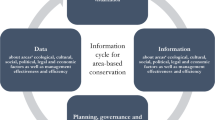Abstract
A post-positivist understanding of ecological science and the call for an “ecological ethic” indicate the need for a radically new approach to evaluating environmental change. The positivist view of science cannot capture the essence of environmental sciences because the recent work of “reflexive” ecological modelers shows that this requires a reconceptualization of the way in which values and ecological models interact in scientific process. Reflexive modelers are ecological modelers who believe it is appropriate for ecologists to examine the motives for their choices in developing models; this self-reflexive approach opens the door to a new way of integrating values into public discourse and to a more comprehensive approach to evaluating ecological change. This reflexive building of ecological models is introduced through the transformative simile of Aldo Leopold, which shows that learning to “think like a mountain” involves a shift in both ecological modeling and in values and responsibility. An adequate, interdisciplinary approach to ecological valuation, requires a re-framing of the evaluation questions in entirely new ways, i.e., a review of the current status of interdisciplinary value theory with respect to ecological values reveals that neither of the widely accepted theories of environmental value—neither economic utilitarianism nor intrinsic value theory (environmental ethics)—provides a foundation for an ecologically sensitive evaluation process. Thus, a new, ecologically sensitive, and more comprehensive approach to evaluating ecological change would include an examination of the metaphors that motivate the models used to describe environmental change.
Similar content being viewed by others
Notes
Policy formation and evaluation is a two-phased process [1]. The phases, while intermixed in time, are characterized by the different frame given the questions addressed and the purposes driving choices. In the Reflective Phase goals are discussed and strategies are formed. In adaptive management, the reflective phase is important because it is in this phase that one evaluates outcomes of prior actions and prepares new experiments to reduce uncertainty. In the Action Phase actions are undertaken based on agreed-upon goals according to agreed-upon strategies. Again, in a system of management that is functioning adaptively, actions will be taken both to address perceived problems, but also to reduce uncertainty and learn from doing [1].
Traditional environmental economists, despite some interesting hand-waving, have not succeeded in developing a method that can capture what one would usually call ecologically valuable aspects of nature. For example, A.M. Freeman, III, whose book speaks with authority with respect to the measurement of environmental and resource values offers the following “qualification” near the end of his survey of the economic approach: “the economic framework with its focus on the welfare of humans, is inadequate to the task of valuing such things as biodiversity, the reduction of ecological risks, and the protection of basic ecosystem functions. When policies to protect biodiversity or ecosystems are proposed, economists may be able to say something sensible about the costs of the policies; but except where nonuse values are involved and where people use ecosystems…economists will not be able to contribute comparable welfare measures on the benefit side of the equation [16, p. 485].
There is, of course, considerable controversy regarding whether placing dollar values on ecosystem services can fill the gaps mentioned by Freeman in the last footnote.
References
Norton, B. G. (2005). Sustainability: A philosophy of adaptive ecosystem management. Chicago: University of Chicago Press.
Proctor, R. N. (1991). Value-free science? Purity and power in modern knowledge. Cambridge, MA: Harvard University Press.
Kuhn, T. (1962). The structure of scientific revolutions. Chicago: University of Chicago Press.
Kuhn, T. (1970). The structure of scientific revolutions (2nd ed.). Chicago: University of Chicago Press.
Norton, B. G., & Noonan, D. (2007). Ecology and valuation: Big changes needed. Ecological Economics, 63, 664–675.
Pickett, S. T. A., & Cadenasso, M. L. (2006). Advancing urban ecological studies: Frameworks, concepts, and results from the Baltimore ecosystem study. Austral Biology, 31, 114–125.
Pickett, S. T. A., Cadenasso, M. L., & Grove, J. M. (2004). Resilient cities: Meaning, models, and metaphor for integrating the ecological, socio-economic, and planning realms. Landscape and Urban Planning, 69, 369–384.
Pickett, S. T. A., & Cadenasso, M. L. (2002). The ecosystem as a multidimensional concept: Meaning, model, an metaphor. Ecosystems, 5, 1–10.
Kolasa, J., & Pickett, S. T. A. (2005). Changing academic perspectives of ecology: A view from within. In E. A. Johnson & M. J. Mappin (Eds.), Environmental education and advocacy: Changing perspectives of ecology and education. Cambridge, UK: Cambridge University Press.
Clark, T. W. (2002). The policy process: A practical guide for natural resource professionals. New Haven: Yale University Press.
Taylor, P. (2005). Unruly complexity: Ecology, interpretation, engagement. Chicago: University of Chicago Press.
Leopold, A. (1949). A sand county almanac and sketches here and there. Oxford, UK: Oxford University Press.
Costanza, R. (Ed.). (1991). Ecological economics: The science and management of sustainability. New York: Columbia University Press.
Stone, C. D. (1987). Earth and other ethics: The case for moral pluralism. New York: Harper and Row.
Rittel, H., & Webber, M. M. (1973). Dilemmas in the general theory of planning. Policy Sciences, 4, 155–169.
Freeman, A. M. (1993). The measurement of environmental and resource values: Theory and methods. Washington, DC: Resources for the Future.
Kempton, W., Boster, J. S., & Hartley, J. A. (1995). Environmental values in American culture. Cambridge, MA: MIT Press.
Acknowledgment
Research for this paper was supported by a grant from the Human Social Dynamics program of the National Science Foundation (NSF grant number SES-0433165).
Author information
Authors and Affiliations
Corresponding author
Rights and permissions
About this article
Cite this article
Norton, B.G. Beyond Positivist Ecology: Toward an Integrated Ecological Ethics. Sci Eng Ethics 14, 581–592 (2008). https://doi.org/10.1007/s11948-008-9095-0
Received:
Revised:
Accepted:
Published:
Issue Date:
DOI: https://doi.org/10.1007/s11948-008-9095-0




